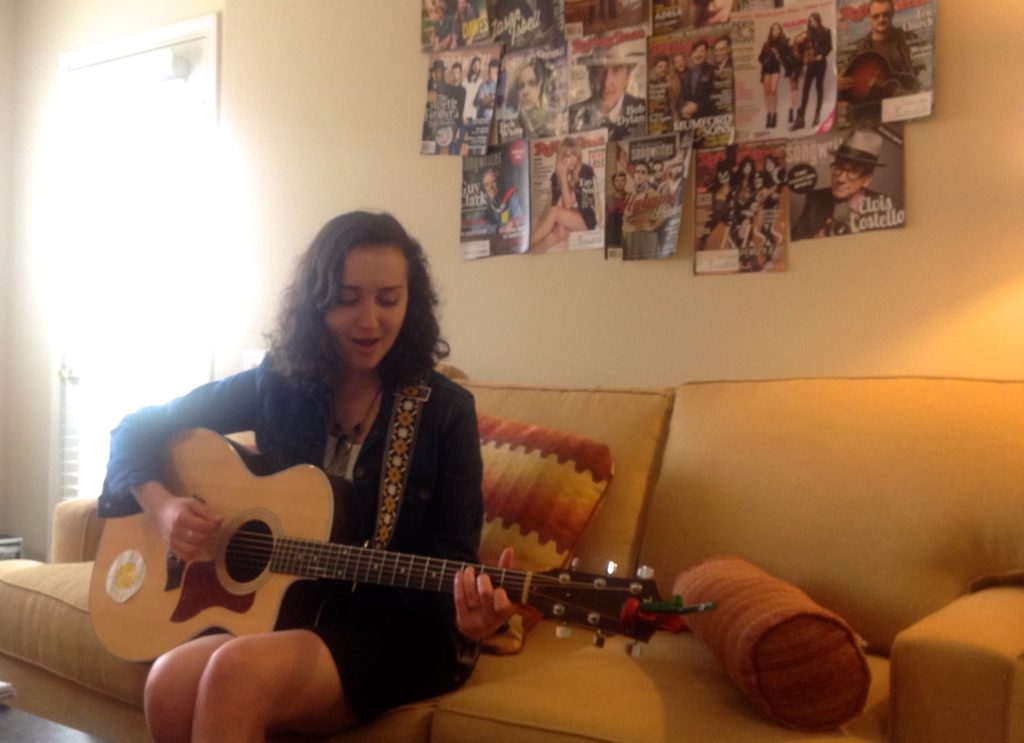
To write a great country song, they say, you need three chords and the truth. These days, you may also need a few self-produced albums, a dozen social media accounts and several thousand online fans before you can get anyone to listen to it.
In a music industry revolutionized by the Internet, aspiring artists are trying to balance their work as musicians with the increasing demands of social media.
That’s something on 18-year-old Olivia Frances’ mind as she goes over her to-do list on a recent Friday morning. She’s sitting in an armchair in her Nashville apartment, hunched over a laptop. One of her songs is playing on Soundcloud, a music distribution site.
“You can look on here see how many plays it’s gotten and how many likes it’s gotten,” she says, pointing to the screen.
Frances moved to Nashville last summer to propel her career as a singer-songwriter. She estimates that she spends about two hours a day on social media — a part of the job that surprised her, because it has very little music involved.
“I try and be everywhere [online] I can, because I don’t know who’s going to find my music,” she says. “Anyone can find it at any time.”
So she’s trying to be active on at least a dozen social media sites. There’s Facebook, Twitter, Instagram, Tumblr, Vine — all standard fare for a teenager these days. Then there are the music sites that start getting pretty niche: YouTube, Spotify, Soundcloud, Google Play, Broad Jam, Music X-ray, Bandcamp, Reverb Nation.
And she can’t forget her email listserv for hardcore fans, or her website, which she has to keep updated too.
“It’s so hard to keep track of them all,” she says. “I actually have, in my calendar, ‘Post something to Tumblr,’ so I don’t forget.”
Even for the rest of us, keeping up with the growing number of social media platforms can be a burden. But it’s usually an optional one. Not so for Frances — she believes her career as a young do-it-yourself artist depends on it.
“If somebody goes on my website, let’s say, and I forget to update my show schedule, and they want to see me at a show, I just lost a fan,” she says.
Focus On One Platform
You do have to be everywhere your fans are, agrees Charles Alexander, a digital strategist at Outside The Box Music. But there’s a limit, he says: Your fans are not everywhere.
Sure, being popular in the right places can translate to real life success, he says, like selling more albums or tickets. He’s seen artists begin to “move the needle” in their careers with 5,000 fans on a mailing list, 5,000 followers on Twitter or 10,000 likes on Facebook.
But Alexander is quick to point out — this is not a foolproof formula. A like on Facebook only matters if it belongs to a real fan. And he says the best way to develop fans online is for artists to focus on one social media platform they’re really good at.
“So if you’re more of a visual artist, certainly you should be on YouTube. If you’re much more confident in Instagram, you should do that first. If you’re quick-witted, maybe Facebook and Twitter — more so Twitter — is your platform,” he says. “Figure out which platform feels most authentic to you.”
Not to bring every Nashville music story around to Taylor Swift, but Swift is one of the best examples of this. In 2008, the New York Times
praised the then 18-year-old for her proficiency on Myspace. She would post homemade videos lip-syncing to pop songs or talking to her cat.
Of course, that was back in the day when Myspace was the big music networking site. Now dozens of others are vying for that title, and more are entering the landscape all the time.
But Alexander says, Taylor Swift’s basic principle — focusing on a single platform first — is still applicable. The alternative, trying to be everywhere, is just not productive.
“What can happen is, you’re on a learning curve on so many platforms,” he says, “and because there’s just a finite amount of time, you sacrifice what you’re doing creatively.”
Don’t Forget Talent
Sacrificing creativity is something musicians can’t afford to do, because in the music business, even tens of thousands of fans won’t compensate for old-school, raw talent.
This is Steve Markland’s philosophy, he tells me in a studio on Music Row. Markland is an artist developer for Downtown Publishing Company, and we’re watching singer-songwriter Jillian Jacqueline record a demo. Markland signed her last December. He says her social media presence was fine — but it didn’t catch his attention.
“But not a presence that really got my attention. I was really just enamored with her voice and songs,” he says. “If I’ve got a lot of social media, but I don’t have great voice and I don’t have songs, then I don’t really have much of anything.”
Still, he admits, it’s a balance. If an artist doesn’t have anything online or any kind of fan base, that’s a turnoff too.
That balance of social media and music is something that 18-year-old Olivia Frances is still trying to perfect. She may have too many social media accounts to keep track of, but for every hour she’s online, she’s spending several more performing or writing with other Nashville musicians.
Often, the two collide. At the end of a songwriting session with guitarist Ben Potter, she pulls out her iPhone and asks to take a selfie.
She’s going to tweet it, #songwriters #MusicCity.


